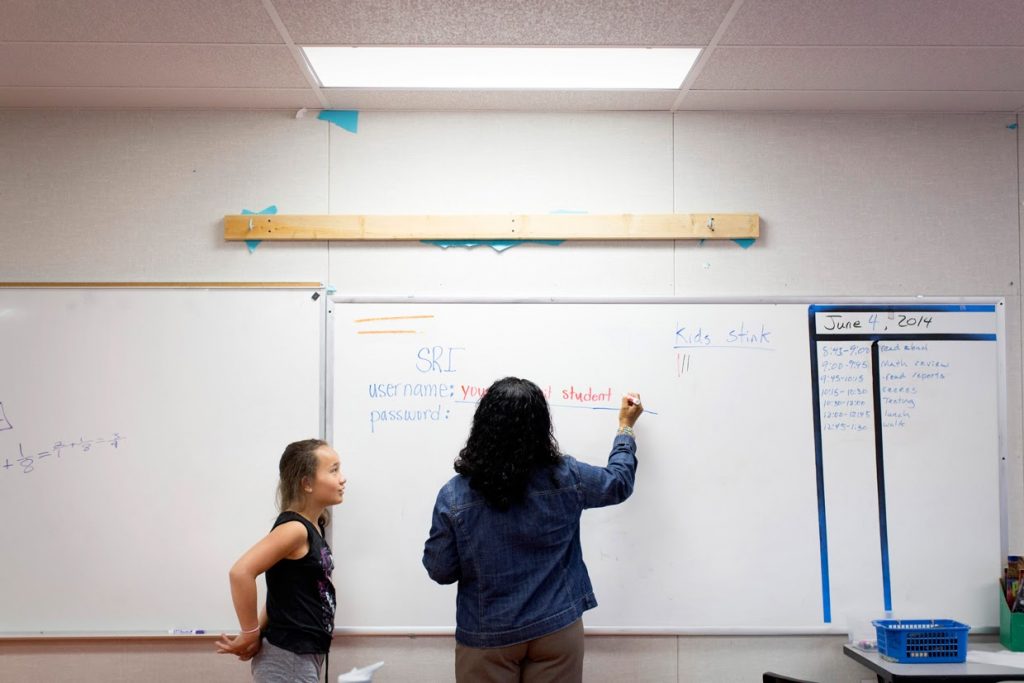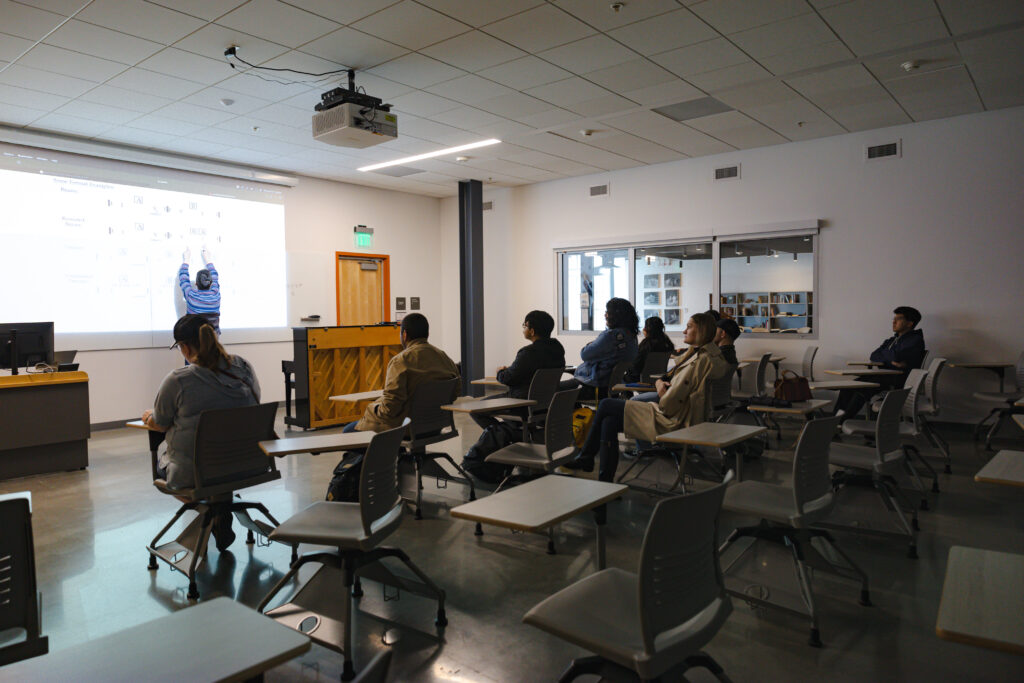
Black teachers: How to recruit them and make them stay

Lessons in higher education: What California can learn

Keeping California public university options open

Superintendents: Well-paid and walking away

The debt to degree connection

College in prison: How earning a degree can lead to a new life

For classroom teachers, professional training can be a mixed bag that too often leaves teachers uninspired with no improvement in student learning, according to a new report by the Learning Policy Institute.
So researchers for the nonprofit institute set out to find what works best in helping teachers to improve teaching methods and their students’ learning and test scores. In reviewing results of 35 previous studies, the new report urges that mid-career teacher training, which is also known as professional development, focus tightly on the academic subjects’ content, incorporate active learning, encourage collaboration, provide coaching, and be of sustained duration, among other things.
“It is obviously most important that what teachers are taught reflects the practices that can actually make a positive difference for student learning. That is, the content of professional development matters, along with its form,” said the report titled “Effective Teachers Professional Development.” Its authors include Linda Darling-Hammond, president of the Learning Policy Institute and chairwoman of the California Commission on Teacher Credentialing.
The report reviewed studies that found even some well-funded professional development programs with poor results because they did not take into account teachers’ own knowledge and skills, whether mid-career or new to the classroom, and did not provide any follow-ups. Other studies showed that teacher training sessions were often too short, badly focused and awkwardly scheduled, usually in after-school workshops.
“Even the best designed (professional development) may fail to produce desired outcomes if it is poorly implemented due to barriers such as inadequate resources, including needed curriculum materials; lack of shared vision about what high-quality instruction entails; lack of time for planning and implementing new instructional approaches; conflicting requirements, such as scripted curriculum or pacing guides; and lack of adequate foundational knowledge on the part of teachers,” the Learning Institute report said. The institute, which has offices in Palo Alto and Washington, D.C., urged school districts and teachers to redesign the programs so that teachers can incorporate new and improved practices in the classroom.
On the positive side, the report cited a 2011 study of a program aimed at improving the teaching of biology in California high schools. More than 40 teachers came together for a week in the summer and other sessions during the school year that all focused tightly on texts and classroom exercises, analyzed student work and developed reading logs for students. Participants stayed in touch on a listserv that fostered the exchange of resources and ideas and was moderated by coaches. The students of these participants later showed significant improvements in both reading and in biology test scores.
“In the end, well-designed and implemented professional development should be considered an essential component of a comprehensive system of teaching and learning that supports students to develop the knowledge, skills, and competencies they need to thrive in the 21st century,” the Learning Policy Institute report stated.
Other report authors were Maria E. Hyler, deputy director of the Learning Policy Institute’s Washington office, and Madelyn Gardner, a research and policy associate.

The overreliance on undersupported part-time faculty in the nation’s community colleges dates back to the 1970s during the era of neoliberal reform — the defunding of public education and the beginning of the corporatization of higher education in the United States. Decades of research show that the systemic overreliance on part-time faculty correlates closely with declining rates of student success. Furthermore, when faculty are… read more

Panelists discussed dual admission as a solution for easing the longstanding challenges in California’s transfer system.

A grassroots campaign recalled two members of the Orange Unified School District in an election that cost more than half a million dollars.

Legislation that would remove one of the last tests teachers are required to take to earn a credential in California passed the Senate Education Committee.
Comments (5)
Comments Policy
We welcome your comments. All comments are moderated for civility, relevance and other considerations. Click here for EdSource's Comments Policy.
Shammy Peterson 3 years ago3 years ago
I found it helpful when you said that professional development is an essential component of a comprehensive system of teaching and learning that supports students in developing their knowledge and skills. This reminded me of teachers who may have had not attended training sessions for the past months. I could imagine how they should undergo equity professional training given how fast-changing the world is. Surely, proper training could equip them with the right approach to every student.
Will 6 years ago6 years ago
These teacher training programs are a huge obstacle for getting excellent teachers in public schools. Professionals who have backgrounds in other expertise are being banned from the classroom because they don't want to waste their time and money listening to a bureaucrat babble on about learning theory for a year or two. School districts need to be free to hire the best teachers out there regardless if they have a piece of paper or not. … Read More
These teacher training programs are a huge obstacle for getting excellent teachers in public schools. Professionals who have backgrounds in other expertise are being banned from the classroom because they don’t want to waste their time and money listening to a bureaucrat babble on about learning theory for a year or two. School districts need to be free to hire the best teachers out there regardless if they have a piece of paper or not. Currently the greatest minds in their fields are not allowed to become teachers. The bureaucracy has taken over public education. The amount of red tape a teacher has to wade through to get in the classroom is keeping intelligent people out, and leaving mediocrity in.
Rosalind Henderson 7 years ago7 years ago
As an educator, it is amazing how often we hear the obvious and yet things remain status quo. Sometimes, the presenters have not been adequately trained, yep a lack of materials as the presenter presents, and poor follow-up. Yes. There are also conflicting agendas given by principals who lack leadership skills, a focus on things non-essential, and overpacked classes, and teacher burnout are all reasons our impact is diluted. Teacher training is nice. A … Read More
As an educator, it is amazing how often we hear the obvious and yet things remain status quo. Sometimes, the presenters have not been adequately trained, yep a lack of materials as the presenter presents, and poor follow-up. Yes.
There are also conflicting agendas given by principals who lack leadership skills, a focus on things non-essential, and overpacked classes, and teacher burnout are all reasons our impact is diluted. Teacher training is nice. A more systemic approach to success is needed.
Noreen M 7 years ago7 years ago
Glad to hear of the research results. When teachers and students realize the need for reading and writing within all content areas, it would seem that learning would be boosted. PD that provided such practical help as the ones with the bio teachers make sense and validate the experience that I have had.
Dale Hair 7 years ago7 years ago
The conclusions of this review of previous studies certainly aligns with and supports what Learning Forward has been advocating for many years It also supports the definition of professional development in the ESSA. The question now is, With so much evidence of what truly makes a difference, why aren’t more educators experiencing this?